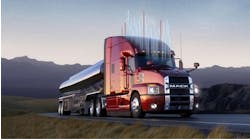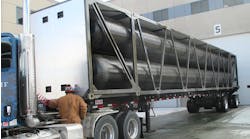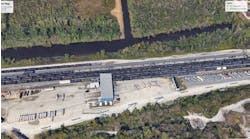Heniff acquires New Orleans tank wash
US Energy to expand in Wisconsin
Wabash acquires TrailerHawk.ai
API launches DEF resource page
This isn’t your grandfather’s tank trailer equipment company.
Kraft Tank Corporation, established in 1949 by Charles P. Kraft and a partner as Tank Kraft Products, started out as a tank trailer manufacturer. It shifted to selling new and used vehicles as The Kraft Tank Company in 1974 under the second-generation direction of Barry B. Kraft, Charles’ son.
But now the Kansas City, Kan.-headquartered company, while still family owned, is focused on establishing a technology-driven, full-scale dealership with modern facilities and capabilities, and a complete set of offerings, including trailer sales, leasing, parts, and service, as envisioned by CEO Spencer Kraft—its third-generation leader.
“One of our main focuses is on the integration of additional technology to help our teams deliver a better customer experience,” Spencer said. “Although our industry doesn’t seem to change at the same rate as others, there are a lot of cool things being developed that could help us achieve this goal.
“If we continue to find ways to positively impact our customer’s businesses, then we’ll continue to grow with them.”
Growing operation
Up until 2015, Kraft still operated out of a modest facility on the south side of Kansas City. Then it relocated to a 40,000-square-foot building with an expanded service department and bays, tank wash, and a 12,000-sq.-ft. parts warehouse just off I-70 in the Fairfax business district, where it’s easily accessible.
A second location focused on parts sales opened in February 2018 in Odessa, Texas, to support activity in the Permian Basin.
The company then moved into Oklahoma, first with a small location in Kingfisher, northwest of Oklahoma City, and now in the city’s heart after debuting its state-of-the-art, full-service tank trailer dealership in April.
Kraft began leasing trailers in 2008, and added parts and services in 2009, and now both of those businesses are booming, and serve to complement its new and used sales of tank trailers and equipment from the top suppliers.
The dealership’s trailer roster includes 14 categories of liquid and dry bulk trailers from leading manufacturers Polar Tank—Kraft’s the No. 1 Polar dealer in the country— Comptank, Etnyre, Gallegos, Heil Trailer, Mac Trailer, and Poly-Coat. The company’s parts department draws from 50 first-rate OEMs, including Betts, Blackmer, BTI, Civacon, Dixon, Gardner Denver, Hannay, LBT, PT Coupling, Ranger, Roper, and many others.
Kraft’s parts department now stocks more than 10,000 SKUs available 24-7 on the company’s e-commerce site. Parts are shipped out the same day, with online orders taken overnight going out the next morning. The OKC parts staff includes service manager Robert Adams, accounts manager Jonathan Copeland, insides sales rep Kimberly Eubank, service advisor Bree Shipley, warehouse manager Dillon Metcalfe, warehouse associate Grant Garner, and seven highly trained technicians.
Kraft also offers storage silos, assembles electric and diesel blower packs with Gardner Denver blowers, and custom specs hoses.
“It’s been tremendous leadership by Spencer that’s taken us to this point,” said Jeremy Capra, Kraft’s parts director. “We’ve really grown that complete parts and service, full-dealership model over the past six years.
“What has made us successful is great customer service and equipment availability.”
Expanded visibility
Work on Kraft’s new flagship facility began last year, but COVID-related delays pushed the grand opening celebration to April.
The 24,000-sq.-ft. building includes office suites, seven service bays, and a parts warehouse that supports fleet maintenance service, parts, an R-stamp fabrication and repair shop, trailer sales, leasing, and mobile tank testing and service. The location also has two wash bays that, as of June, are operated by Quala, which is on-site in Kansas City, too.
“We will always need to have wash services at current and future Kraft facilities to provide that full dealership level of service,” Spencer said. “Quala brings an industry-leading level of expertise in wash services, which allows our teams to pursue further growth in the areas where we consider ourselves to be experts.”
Prime real estate on I-35, and a well-lit, modern facility, provide Kraft a higher level of visibility with current and prospective customers traveling a heavily trafficked corridor that connects Kansas, Oklahoma, and Texas. The location also has 3 additional acres available to customers looking for short- or long-term parking leases.
“I give a lot of credit to Spencer in the sense of how he looks to build our properties,” said COO Steve Larson. “He wants employees to enjoy coming to work, and he wants the space to be bright and totally usable, so that clients and customers are excited to go there. Those are great amenities in an industry that often isn’t as concerned with forward-facing shops. We don’t always have the greatest facilities. So what he’s doing is great. It’s a true differentiator, with the types of locations, services, and facility layouts.”
The OKC location boasts 15 total employees, including sales, parts, and service staff.
Mobile tank services, which include HM-183 cargo tank inspections, cover customers within approximately a five-hour radius of OKC, Capra said. The facility is open from 8 a.m. to 5 p.m. Monday through Friday.
“It was incredibly exciting to open OKC, our first true dealership outside of Kansas City,” Spencer said. “We were excited about the location, the facility, the services we could provide our customers, and the team we built to make all these things a reality. Our ability to execute this model in another market is the future of Kraft.”
New direction
Spencer’s mission includes assembling a team of forward-thinking professionals who can see the business as it should be, instead of what it was.
He tasked Jake Randall with leading Kraft’s leasing business to the next level.
“Jake brings a fresh outside perspective, and his vision aligned perfectly with the company’s desire to move forward with technology to work smarter to support our customers,” Spencer said.
Randall previously worked with Westmor Industries, which has a tank truck and trailer manufacturing division, and spent four years owning his own businesses, including three restaurants. Then he landed a business development role with Freedom Interiors, which is where he met Spencer, who at the time was researching workspace design and furniture options for the new OKC office. Randall joined Kraft in September 2020.
“We had the same drive, and same understanding of what it takes to really grow something, and get into the details of every aspect, really caring about processes, customers, and your employees, and then setting goals and achieving them,” Randall said.
Randall first had to learn the ropes, a task made easier with help from industry experts like Brian Pursley, Kraft’s sales director, who helped educate him on the myriad types of tank trailer equipment, suppliers, and customers in industries ranging from agriculture, construction, and manufacturing to oil & gas, and food & beverage.
“My first objective was to walk in the shoes of our customers,” Randall said. “What are they going through? What’s an owner-operator going through, and what is the large fleet manager going through? What are their needs?
“At the end of the day, it’s all about making the customer’s life easier.”
They’ve done that by bolstering their inventory, staff, and technology implementation.
The leasing business added trailers this year, and the fleet now includes in excess of 500 pieces of equipment. The staff includes two coordinators who help serve customers in Kansas and Oklahoma, and asset managers who keep a close watch on the grounds, making sure trailers always are in the right location, and in the correct condition.
Technology updates include a newly redesigned leasing page at krafttank.com that includes GPS-enabled live inventory, customer testimonials, and the pros and cons of leasing vs. buying; and breaks down the “three simple steps” of leasing from Kraft, highlighted by the advanced ability to digitally sign documents.
“When you lease something, there’s a lot of paperwork,” Randall explained. “There are a lot of signatures, and boxes to check. So we made it a simpler process. I call it the ‘1-2-3.’ You go online, fill out an application, send us the COI (certificate of insurance), and we sign the lease. So we simplified a mundane process, and made it much easier. And it’s all digital. You can go online and see everything we have available right now. The whole process takes five to 10 minutes, and you can do it from a phone, tablet, or computer.”
Once the lease is signed, customers can come pick up equipment, or Kraft can arrange for delivery nationwide.
Reasons to lease include easier market entry, capital preservation, supplemental equipment for seasonal operations or contract work, no finance charges, access to technology and services, and tax write-offs. “Under a lease-purchase agreement, 100% of the lease payments are tax deductible, which is a big deal on the tax side,” Randall said. Kraft leases new and used equipment, and offers a variety of terms, from one month to five years.
“I started the leasing side of our business a few years ago with no huge expectation as to where it would go,” Spencer said. “It’s very unique, and the lessons learned along the way have positioned us well for continued growth. Leasing is an integral part of Kraft, as it provides yet another layer of service to our customers.”
What’s next?
Kraft continues to eye potential new locations, markets, and innovations, while navigating a post-pandemic economy that includes supply-chain challenges and opportunities, and plenty of business from customers who need capacity.
Randall said they’ll continue to streamline Kraft’s standard trailer specs, while looking to add new options for customers, like a back-end portal that enables them to track and manage leased equipment, and new mileage-based leasing terms that allow lessees to forego traditional down payments and deposits.
“With all the technology we have on our trailers now, through GPS, we can really start to track a lot more things, from a mileage standpoint, and a wear-and-tear standpoint,” Randall said. “So one of the things I want to do, to make leasing easier for our customers, is offer them options, as far as a deposit or mileage package that protects them. They’d pay ‘x’ amount per mile, and then we would cover the tires, brakes, wheel hubs, seals, all of that, and link them with a network of service departments across the country.”
Kraft also is looking to add more trailer equipment—but that’s easier ordered than received.
Randall said the crude trailer market’s still slow, but overall business is “insane.” Chemical and pneumatic trailers are in high demand, as are key specs, like vapor recovery for chemical trailers, and drum brakes.
Capra said blowers are a hot commodity for clients who are setting up new trucks in their bustling businesses, and while some parts have been hard to source, they’ve found resourceful ways around shortages that keep customers from feeling the pain. “Like many other dealers, the on-going impact of COVID on manufacturers and supply chains continues to be a challenge,” Spencer said. “New-equipment lead times, material surcharges, parts delays, and manpower shortages at factories, are all things our teams work diligently to overcome every day. Although customers in our industry understand these challenges aren’t going away anytime soon, we still try to do everything we can to support their businesses.
“Even with all of these challenges, Kraft in on pace for a record year, and I appreciate the flexibility and diligence of our teams finding new avenues to keep our customers up and running.”









